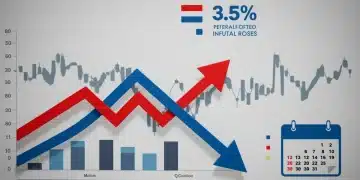Record inflation insights that everyone should know

Record inflation significantly impacts personal finances by increasing prices for goods and services, thereby reducing purchasing power and requiring proactive budgeting and investing strategies to maintain financial stability.
Record inflation insights are rapidly becoming essential knowledge for anyone wanting to manage their finances wisely. With prices rising, how can we adapt and make informed decisions?
Understanding record inflation and its causes
Understanding record inflation and what causes it can help us navigate our economy more effectively. Inflation occurs when the prices of goods and services rise over time. This is measured through various indexes, with the Consumer Price Index (CPI) being one of the most widely known.
One major cause of inflation is an increase in demand. When people want to buy more goods and services than what is available, prices tend to rise. This is often seen during periods of economic growth when consumers feel confident about spending.
Supply Chain Disruptions
Another significant factor affecting inflation is supply chain disruptions. When there are issues in the supply chain—like transportation delays or shortages of materials—businesses may struggle to keep up with demand. This can lead to higher prices since the available products become scarce.
- Increased shipping costs
- Shortages of raw materials
- Labor shortages affecting production
Furthermore, energy prices also play a crucial role. If oil prices surge, this affects transportation costs, which in turn influences the price of nearly all goods. Consumers notice these changes every time they fill up their gas tanks or buy groceries.
Government Policies
Government policies, like monetary policy, are also key contributors to inflationary pressures. When central banks, like the Federal Reserve, lower interest rates to stimulate the economy, it can result in more money circulating. If this money supply grows faster than the economy, inflation can result.
Understanding all these factors is essential, as they can vary from time to time. Keeping informed about changes in the economy, prices, and government actions can help us make smarter financial decisions.
The impact of inflation on daily expenses
The impact of inflation on daily expenses is a topic that affects everyone. As prices rise, consumers find that their purchasing power decreases. This can make it difficult for families to maintain their standard of living.
Food prices often see some of the most noticeable increases. When inflation rises, grocery bills can soar, forcing families to rethink their shopping habits. Buying in bulk or choosing generic brands can help stretch budgets further.
Housing Costs
Housing costs are another major area affected by inflation. Rent and mortgage payments can increase, making it harder for people to find affordable living situations. Landlords might raise rents in response to rising costs, further squeezing renters.
- Increased utility bills
- Higher property taxes
- Rising home maintenance costs
Transportation costs also reflect the impacts of inflation. With fuel prices rising, the cost of commuting to work can eat into budgets. Many families may choose to carpool or use public transport to mitigate these increases.
Overall Budgeting Strategies
Many consumers begin adjusting their budgets as a reaction to inflation. It becomes essential to track spending closely. Setting strict budgets for various categories, such as entertainment and dining out, can help manage expenses better.
Using budgeting apps or tools can also provide better visibility into monthly expenses and help identify areas where savings can be made. Overall, understanding the impact of inflation can empower consumers to make smarter financial decisions.
How inflation affects savings and investments

Understanding how inflation affects savings and investments is vital for financial planning. As inflation rises, the real value of money decreases, affecting what you can buy with your savings in the future.
When inflation is high, the interest rates on savings accounts often do not keep pace. This means that money placed in these accounts can lose purchasing power. If you are earning less interest than the rate of inflation, your savings can diminish in value over time.
The Impact on Investments
Investments can also be significantly impacted by inflation. For instance, stocks might provide better protection against inflation than bonds. This is because companies can often raise prices to maintain their profit margins, which can, in turn, increase their stock values.
- Stocks often outpace inflation over the long term.
- Bonds may suffer if interest rates rise to combat inflation.
- Real estate can be a hedge against inflation as property values generally increase.
Inflation reduces the purchasing power of fixed-income investments like bonds. As prices go up, the fixed payments from bonds become less valuable, leading to a struggle for investors relying on these income sources.
Strategies to Protect Your Savings
To protect savings from the harmful effects of inflation, consider diversifying your portfolio. Investing in assets that traditionally outperform inflation can be beneficial. This includes stocks, real estate, and commodities.
Moreover, inflation-protected securities, such as TIPS (Treasury Inflation-Protected Securities), are designed to increase with inflation, providing a safety net for your investments. Keeping an eye on inflation trends can also help you make informed decisions about your savings and investment strategies.
Tips to protect your finances during high inflation
During times of high inflation, it becomes crucial to protect your finances. Rising prices can impact your day-to-day expenses and savings. Implementing effective strategies helps maintain your financial stability.
One of the first steps to take is to review your budget regularly. Identify essential expenses and cut back on non-essential items. This can free up cash flow to manage rising costs better. Staying within your budget can ensure you continue to meet your financial obligations.
Build an Emergency Fund
An emergency fund is essential, especially during inflationary periods. Aim to save three to six months’ worth of living expenses. This fund provides a financial cushion in case of unexpected expenses or loss of income.
- Start small and increase savings gradually.
- Keep the fund in a separate, easily accessible account.
- Avoid using the fund for non-emergencies.
Consider diversifying your investment portfolio. Assets like real estate, stocks, and commodities can provide better returns and keep pace with inflation. Investing in inflation-protected securities can also safeguard your savings from erosive inflation effects.
Adjust Spending Habits
Changing spending habits can significantly impact your finances. Seek out better deals and consider using coupons or cashback apps. Simple changes in shopping can lead to substantial savings.
Additionally, cooking at home instead of dining out can lower food costs. Keeping track of prices and exploring bulk buying options can also help you navigate high inflation. The key is to remain proactive and adjust plans as prices change.
Future predictions: What to expect with inflation
Future predictions regarding inflation can be vital for planning your finances. Economists analyze various indicators to forecast how prices may change over time. This includes monitoring employment rates, consumer spending, and supply chain dynamics.
One trend to consider is how inflation often follows changes in monetary policy. When central banks raise interest rates, the goal is usually to curb inflation. However, these adjustments can take time to affect the economy. Understanding the lagging impact helps in anticipating what might happen next.
Impact of Supply Chain Issues
Supply chain disruptions can continue to influence inflation in the near future. Ongoing shortages of goods can keep prices elevated as demand outpaces available supply. If businesses cannot meet consumer needs, inflation may persist.
- Increased manufacturing costs due to limited resources.
- Higher shipping costs affecting the delivery of goods.
- Persistent shortages of essential products.
Another factor to consider is labor market dynamics. As wages rise to meet living costs, businesses may pass those costs onto consumers, further fueling inflation. Monitoring wage trends can offer insight into future price increases.
Global Economic Factors
Global events such as geopolitical tensions, natural disasters, and economic policies in other countries can also affect inflation rates. These factors can lead to unexpected shifts in trade and investment flows, impacting local prices.
As you look ahead, it becomes essential to stay informed about economic indicators and potential fluctuations. Keeping an eye on trends can aid in making well-informed financial decisions. Seeing how inflation evolves over time requires continuous observation and adjustment of financial strategies.
FAQ – Frequently Asked Questions about Inflation and Finances
What should I do to protect my savings during high inflation?
To protect your savings, consider building an emergency fund, diversifying your investments, and reviewing your budget regularly to cut unnecessary expenses.
How does inflation affect my daily expenses?
Inflation increases the prices of goods and services, which means you will spend more on everyday items like food, housing, and transportation.
Are there specific investments that do well during inflation?
Yes, investments such as stocks, real estate, and commodities often perform better during inflationary periods as they tend to increase in value over time.
How can I stay informed about inflation trends?
You can stay informed by following economic news, subscribing to financial newsletters, and monitoring reports on consumer prices and economic indicators.





